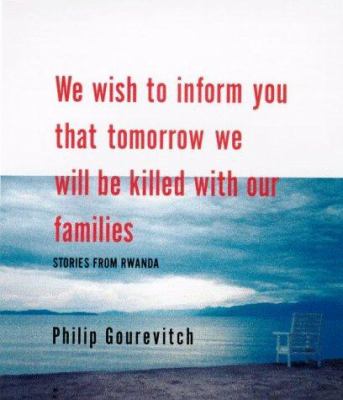
by Philip Gourevitch
Library Journal In 1994, the world was informed of the inexplicable mass killings in Rwanda, in which over 800,000 were killed in 100 days. Gourevitch, a staff writer for The New Yorker, spent over three years putting together an oral history of the mass killing that occurred in this small country. He interviewed the survivors, who told him their horror stories of violence. Most of the killings were done with a machete. Friends killed friends, teachers killed students, and professional workers killed co-workers. The United Nations was slow in reacting to this crisis and refused to classify the incident as genocide. The title of this book comes from a Tutsi pastor's letter to his church president, a Hutu. While this is a powerful book, it sometimes bogs down in the details of Rwandan politics. It is doubtful the average reader will want to pick it up, but the history of this genocide must be told. This book should find itself on the shelves of academic libraries where African history collections are strong. [Previewed in Prepub Alert, LJ 5/15/98.]?Michael Sawyer, Northwestern Regional Lib., Elkin, NC Copyright © Reed Business Information, a division of Reed Elsevier Inc. All rights reserved. Book list The West's conventional wisdom blames ancient hatreds--"ethnic" in the former Yugoslavia, "tribal" in central Africa--for a kind and degree of savagery few can comprehend. It is an easy explanation, justifying inaction. But was it really so mindless and simple, New Yorker staff writer Gourevitch wondered? In 1994, Rwanda's Hutus, egged on by government, media, and the ruling class, killed 800,000 in 100 days, mostly members of the Tutsi minority but also Hutus who helped Tutsis rather than murdering them. After the massacre, Gourevitch spent months in a Rwanda struggling to recover from the horror; in Zaire, where some refugee camps trained Hutus for continued genocide; and in other African states whose leaders were convinced, by the international community's fecklessness in Rwanda, to help overthrow Zairean dictator Mobutu Sese Seko. With a new rebellion brewing in Zaire, Gourevitch offers vital historical context. In a world where too many groups seek their enemies' extermination, his conversations with central Africans shed light on the worst and best of which humans are capable. --Mary Carroll From Booklist, Copyright © American Library Association. Used with permission. Publishers Weekly What courage must it have required to research and write this book? And who will read such a ghastly chronicle? Gourevitch, who reported from Rwanda for the New Yorker, faces these questions up front: "The best reason I have come up with for looking more closely into Rwanda's stories is that ignoring them makes me even more uncomfortable about existence and my place in it." The stories are unrelentingly horrifying and filled with "the idiocy, the waste, the sheer wrongness" of one group of Rwandans (Hutus) methodically exterminating another (Tutsis). With 800,000 people killed in 100 days, Gourevitch found many numbed Rwandans who had lost whole families to the machete. He discovered a few admirable characters, including hotelier Paul Rusesabagina, who, "armed with nothing but a liquor cabinet, a phone line, an internationally famous address, and his spirit of resistance," managed to save refugees in his Hôtel des Milles Collines in Kigali. General Paul Kagame, one of Gourevitch's main sources in the new government, offers another bleak and consistent voice of truth. But failure is everywhere. Gourevitch excoriates the French for supporting the Hutus for essentially racist reasons; the international relief agencies, which he characterizes as largely devoid of moral courage; and the surrounding countries that preyed on the millions of refugees?many fleeing the consequences of their part in the killings. As the Rwandans try to rebuild their lives while awaiting the slow-moving justice system, the careful yet passionate advocacy of reporters like Gourevitch serves to remind both Rwandans and others that genocide occurred in this decade while the world looked on. (Oct.) Copyright © Reed Business Information, a division of Reed Elsevier Inc. All rights reserved. Library Journal A staff writer for The New Yorker offers his first book: a dissection of the genocidal violence in Rwanda, where 800,000 Tutsi were killed by the Hutu majority in 100 days. The title is taken from a letter by a Tutsi pastor to his church president, a Hutu. Copyright © Reed Business Information, a division of Reed Elsevier Inc. All rights reserved. Choice About 800,000 Tutsi were murdered by Hutu in a frenzy of orchestrated killings that began with widespread massacres in April 1994 and continued for two months until an army of Tutsi from Uganda gained the upper hand. Gourevitch is an acute journalistic observer. His interviews with survivors convey the enormous brutality of the genocide in a way impossible in an academic account. He visited the churches where Tutsi took refuge and were slaughtered. He visited the mass graves. He found the older persons or children who somehow escaped. But his is much more than a recitation of horror. By piling detail on detail and personal account on personal account, Gourevitch conveys the extent to which Hutu extremists induced villagers to destroy their compatriots, all of whom spoke the same language, shared the same religions, and had common physical characteristics. But they were identifiable as Tutsi, or they were Hutu who refused to kill. And so they were destroyed. The messages of this moving account are several: that the UN and the West could have intervened to prevent the massacres from becoming a genocide; that fear of "the other" is capable of turning apathetic villagers into butchers; that genocides are directed and serve powerful political ends. General readers; undergraduates. R. I. Rotberg; Harvard University Copyright American Library Association, used with permission. |